- HOME
- ABOUT ME
- movies
- MEDIA
- L.Onerva
- Eino Leino
- Eeva-Liisa Manner
- Erään Opon päiväkirja
- Elämänkenttäni
- Elämäni ”viiva”
- Käyttöteoriani – se miten minä ohjaan
- Kulttuuritietoinen ja kansainvälistyvä ohjaus
- Ohjauksen järjestäminen maahanmuuttajakoulutuksessa
- Ohjauksen yhteiskunnallinen viitekehys
- Ohjaukäsite
- Oma opiskeluorientaatio
- Opiskelijoiden yksilöllisyys ohjauksessa
- EETTISET KYSYMYKSET
- Psykososiaalisen kehityksen teoria
- Suhteeni erilaisuuteen ja tehtäväni opinto-ohjaajana
- Opinto-ohjauksen ja erityisopetuksen yhtäläisyyksiä ja eroja
- Kehitykseni opinto-ohjaajana
- Maahanmuuttajan uraohjaus
- Maahanmuuttajien ohjaus ja neuvonta: kuka, mitä, miten?
- Ohjauksen tulevaisuus
- Elämänkenttäni
- Mariana Marin
- Claudiu Komartin
- Mariana Codrut
- Roland Erb
- Romanian poetry
- ESSAYS
- STORIES
- CLASSIC POETRY
- CONTEMPORARY POETRY
- TRANSLATED POEMS
- READING POETRY
- CONTACT
- translated Italian-English
- translated Italian-Romanian
- translated Spanish-English
- translated Spanish-Romanian
Mariana
Fără ei / Without them
POSTED IN Mariana September 16, 2023
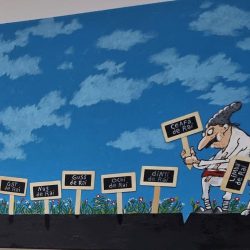
Fără ei / Without themFără prietenii mei – tinerii poeți germani din România –
subiectivitatea și-ar mai fi supt și acum degetul
în fața realității.
Ușor nătângă și îngrozită de propria sa umbră,
n-ar fi înțeles niciodată de ce
poezia a fost invadată de mirosul măcelăriilor
și al sălilor de disecție cu program continuu.
Fără ei ar fi fost mai greu.
Mi-ar fi crescut pe creier micuța ciupercă burgheză
citind sub umbreluță (cu un real interes intelectual!)
romanele obsedantului deceniu
sau problematica prozei sudamericane…
Fără ei aș fi asanat la nesfârșit
ținutul dintre inimă și Carpați,
iar acțiunea singurătății de fier
a locului din care scriu
asupra mijloacelor de expresie
mi-ar fi rămas multă vreme la ușă,
aidoma unui copil părăsit.Fără ei aș fi fost și mai săracă.
„Ceea ce sunt” ar fi deschis prea târziu ochii
spre „Ceea ce suntem”.Limba înfloritoare a mortului
pe care l-am ținut mai ieri în brațe
poate că n-ar fi devenit niciodată
chiar viața mea.
Mariana MARIN
………………Without them
Without my friends – the young German poets from Romania –
subjectivity would still be sucking its finger
at reality.
Slightly dumb and terrified of its own shadow,
it would never have understood why
poetry was invaded by the smell of butcher shops
and round-the-clock dissecting rooms.
Without them it would have been harder.
The little bourgeois fungus would have grown on my brain
reading under an umbrella (with a real intellectual interest!)
the novels of the haunting decade
or the problematics of South American prose…
Without them I would have endlessly sanitized
the land between the heart and the Carpathians,
and the action of the iron loneliness
of the place from which I write
on the means of expression
would have stayed at my door for a long time,
like an abandoned child.Without them I would have been even poorer.
“What I am” would have opened its eyes too late
to “What we are”.The flourishing tongue of the dead
which I held in my arms yesterday
might never have become
my very life.
trad. M. M. Biela
Iluminări / Enlightenment
POSTED IN Mariana September 16, 2023
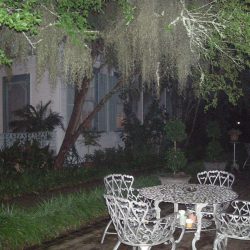
Iluminări / EnlightenmentNe înțelegem din ce în ce mai bine,
în imperiul nostru de frunze uscate
și ne încoronăm pe rând
în cele patru scaune hodorogite
de pe vremea bunicii.
Decât zumzetul puterii
mai bine sudoarea slăbiciunii – spui tu
și pocnesc mugurii desenați pe cana de ceai
(necesitate în sfârșit înțeleasă
a ochilor noștri bolnavi).
În fiecare dimineață
călătorim și noi
de-a lungul și de-a latul terasei.
Decât zumzetul puterii
mai bine sudoarea funiei
– mai aud, mai auzi
din ceea ce am fost,
din ceea ce sigur vom finecesități în sfârșit înțelese
ale viermilor vii
Mariana MARIN…………….
Enlightenment
We understand each other better and better,
in our empire of dry leaves
and we take turns crowning ourselves
in the four old chairs
from grandma’s time.
Rather than the hum of power
better the sweat of weakness – you say
and the buds drawn on the teacup pop
(finally understood necessity
of our sick eyes).
Every morning
we too travel
up and down the terrace.
Rather than the hum of power
better the sweat of the rope
– I still hear, you still hear
of what we were
of what we’ll surely befinally understood needs
of living worms.
trad. M. M. Biela
Casa morții / The house of death
POSTED IN Mariana September 16, 2023
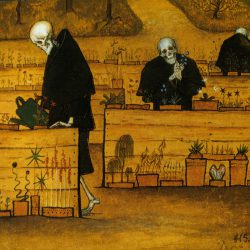
Casa morții / The house of deathÎntre noi n-au mai rămas
decât acești copii de hârtie
pe care dimineața îi traversăm strada.
Refuzul de-a continua altfel specia.
Refuzul meu de a fi o altă casă a morții
pe astfel de vremuri.
Mariana MARIN………………..
The house of death
Between us
there are only these paper children
that we cross the street in the morning.
The refusal to continue the species otherwise.
My refusal to be another house of death
in times like these.trad. M. M. Biela
O caldă înțelegere umană / A warm human understanding
POSTED IN Mariana July 28, 2023
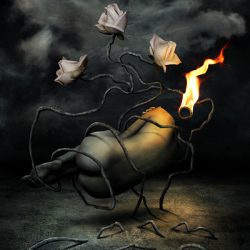
O caldă înțelegere umană / A warm human understanding
Totul este atât de departe,
încât sentimentele și-ar declara singure
legea marțială.
Aici nimeni nu te poate salva.
Dimineața stau de vorbă cu bătrânul Kolea,
– basarabeanul de o sută de ani din inima câmpiei.
Prin fumul gros lăsat de pipele noastre
cuvintele au mai găsit câte o amintire
înfiptă în coapsa vocabularului.
Vorbim despre mugurii calzi și grădinărit,
despre exilul morții de la un anotimp la altul,
despre războiul care amușină în jurul castelului de apă,
despre sensibilitatea ultragiată și despre limba română.
Bătrânul Kolea nu mai are nimic de pierdut.
Eu pierd zilnic totul.
Poate de aceea ne înțelegem atât de bine
când acceleratul de 8 este inundat de o caldă înțelegere umană
și trece el sfios, acceleratul,
prin carnea de o sută de ani,
prin stupii harnici care pot șterge la cer
urmele oricărei crime,
prin hohotul care de-abia mă mai rabdă.
– Sigur că vine o vreme
când trebuie să-ți recapeți demnitatea,
– murmură pedagogic bătrânul Kolea, basarabeanul.
A devenit vinovată trecerea sub tăcere
a numărului de morți de la Dachau și Auschwitz?
A deveniiit…
Să fremătăm atunci de bucurie
tu, spirit,
și tu, hoit!
Poate se va vorbi într-o zi
și despre adevărul acesta
aidoma unei condicuțe ieșită noaptea
să ațâțe gunoiul cât muntele de mare,
cât neputința și bestialitatea ei.Mariana MARIN
……………..
A warm human understanding
Everything is so far away
that the feelings would declare their own
martial law.
No one can save you here.
In the morning I talk with the old man Kolea,
– the hundred-year-old Bessarabian from the heart of the plain.
Through the thick smoke left by our pipes
the words found one more memory
embedded in the thigh of the vocabulary.
We talk about warm buds and gardening,
about the exile of death from one season to another,
about the war sniffing around the water castle,
about the offended sensibility and about the Romanian language.
Old Kolea has nothing left to lose.
I lose everything daily.
Maybe that’s why we get along so well
when the 8 o’clock fast train is flooded with a warm human understanding
and it passes timidly, the fast train,
through the one hundred years flesh,
through the industrious beehives that can erase on the sky
the traces of any crime,
through the roar that can hardly stand me anymore.
– Of course there comes a time
when you have to regain your dignity,
– old Kolea the Bessarabian murmurs pedagogically.
Has become culpable the keeping under wraps of the death toll at Dachau and Auschwitz
It becaaame…
Let us tremble with joy then,
you, spirit,
and you, corpse!
Maybe it will be spoken one day
about this truth also,
like a prostitue who goes out at night
to stir up the garbage as big as the mountain,
as her helplessness and bestiality.trad. M. M. Biela
Leprozeria / The leper colony
POSTED IN Mariana July 28, 2023
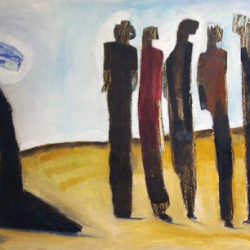
Leprozeria / The leper colonyAveai dreptate, Sebastian Reichmann!
Ne trăiam scalpul cu aceeași ferocitate
pe care am putea-o bănui în burțile copiilor africani.
Ne despărțim mereu de ceva.
O țesătură ușoară de obsesii,
un vânticel de răsărit cu spahii,
o piatră țâșnind din senin
în trenul care te poartă, te poartă
…și pare de-ajuns:
Bolile sociale, aidoma bolilor de piele,
proliferează subtil.
La 1956 nu s-ar putea spune
că Europa nu avea pentru mine
un oarecare mister.
Lupta dintre contrarii
gâfâia pe aproape așteptându-mă,
așteptându-te, vrându-ne vii…
Dar ce poate fi mai frumos
decât o copilărie tăiată mărunt
care să îmblânzească în timp hrăpăreața memorie!Ce bine e să stai mai târziu
cu un ghemotoc de hârtie lipit de cerul gurii:
„Du-te! Du-te!
Palidă și foarte tristă
ești prea goală
pentru veacul eunuc!”
Oricum, de la crima de atunci
la cinismul ei de acum
cărțile morților
au licitat viețile sfinților
și ai învățat să pierzi.
Mariana MARIN…………………
The leper colony
You were right, Sebastian Reichmann!
We were experiencing our scalps with the same ferocity
that we might suspect in the bellies of African children.
We always part with something.
A light fabric of obsessions,
an easterly breeze with spahis,
a stone springing out of nowhere
in the train that carries you, carries you
…and it seems enough:
Social diseases, like the skin diseases,
subtly proliferate.
In 1956 it could not be said
that Europe didn’t have some mystery
for me.
The fight between opposites
was panting nearby waiting for me,
waiting for you, wanting us alive…
But what could be more beautiful
than a childhood chopped up
to tame in time the rapacious memory!How good it is to sit later
with a paper ball stuck to the roof of the mouth:
“Go! Go!
Pale and very sad
you are too empty
for the eunuch age!”
Anyway, since the crime of then
to her cynicism of now
the books of the dead
auctioned the lives of the saints
and you have learned to lose.
trad. M. M. Biela
Săptămâna Patimilor / The Holy Week
POSTED IN Mariana July 19, 2023
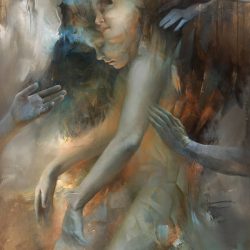
Săptămâna Patimilor / The Holy Week
Duioasă fericire și liniște a cărnii
într-o dimineaţă de odihnă;
și, deodată, amintirea rapiţei
și a elevului K.: „Dacă au semănat porumb
de ce a ieșit atâta rapiţă?”
O Săptămână a patimilor luminată
de o Noapte a Sfântului Bartolomeu
și un fel de păpușă mecanică, rasă în cap,
un fel de gură de câine: „Veniţi de la Poarta Albă?”
Astfel poate începe senzaţia aceea de gol
care anunţă venirea ficţiunii.
Ea trece la numai trei pași de casa ta
și tu îi adulmeci prin aer securea mătăsoasă,
vibraţia semnelor, carnea care i se desprinde încet.
Elevul K. și gura de câine își pot schimba rolurile
și toate sub ochii tăi,
acoperiţi de grămezi nesfârșite de rapiţă…Tu însăţi schimbi dubioasa zi de odihnă legală
cu ecoul livresc al Nopţii Sfântului Bartolomeu;tu însăţi treci mai târziu
la numai trei pași de casa ta,
adulmecând prin aer o băltoacă mătăsoasă,
prin viaţa ta, gură de câine,
păpușă mecanică,
rasă în cap.
Mariana MARIN
…………………..The Holy Week
Sweet bliss and peace of flesh
on a restful morning;
and, suddenly, the memory of rapeseed
and of student K.: “If they sowed corn
why did so much rapeseed come out?”
A Holy Week illuminated
by a Night of St Bartholomew
and a kind of mechanical doll, shaved head,
a kind of dog’s mouth: “Have you come from the White Gate?”
Thus can begin that feeling of emptiness
that heralds the arrival of fiction.
It passes only three steps from your house
and you sniff its silky ax through the air,
the vibration of the signs, its slowly peeling of flesh.
Student K. and the dog’s mouth can switch roles
and all before your eyes,
covered with endless piles of rapeseed…You yourself exchange the dubious legal day of rest
with the bookish echo of St Bartholomew’s Night;thou thyself pass’st later
only three steps from thy home,
sniffing through the air a silky puddle,
through thy life, dog-mouthed,
mechanical doll,
shaved head
trad. M. M. Biela
Pumaho
POSTED IN Mariana July 15, 2023
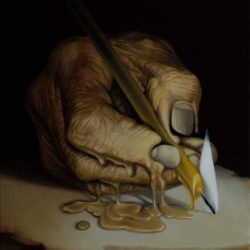
Pumaho
Refuz să mai privesc realitatea în față.
Port în brațe doar poemul acesta
care miroase urât – câine mort.
Îl pocnesc și bucăți de carne
sar din râsul hidos.
Plec atunci la marginea mării să mă spăl.
El îmi sare în față
și mă trezesc în hainele de luni
funcționar tăcut,
spoind lumea cu literele unui alfabet
singuratic și mort.
– Trebuie notat totul, îmi șoptește
manșeta mea roasă de viață.
Inventează acolo unde ochii îți cad înaintea plânsului
și limba se desfată înainte de râs.
Îmi iau atunci sfertul de secol în spate
și, iată, notez:
„La întretăierea drumurilor comerciale
se poate muri prin utopie sau uitare de sine.
O lume brutală, ai spune,
dacă anumite previziuni nu te-ar mai fi dus cu vorba
din epoca ming și te-ar fi părăsit în epoca tao.
La intrarea în muncile de primăvară
mâinile umflate ale copiilor sugrumă ardeiul gras
cu dexteritatea unui mecanism social
și pe cer e numai fum.
Apoi devine o obișnuință.
Mirosul prostiei?
Imaginați-vă
(aici naratorul e alb și tremură
în fața memoriei sale clevetitoare)
carnea a o sută de oi
sub roțile a 21 de vagoane de tren.
Ehei, cum ți-ai mai salva atunci pielea
într-o tăbăcărie umedă,
hohotind sub iarba înaltă!La întretăierea drumurilor comerciale
memoria scapă esențialul, ca într-un fel
de uriașă măcelărie unde mirosurile
se destind și pe cer e numai fum.Trebuie notat totul, spunea
manșeta mea roasă de viață.
La întretăierea acestei lumi
cu imaginea sa despre sine
am privit realitatea în față.
Am fost la marginea mării să mă spăl.
Ochii mi s-au înnegrit înaintea plânsului.Limba mi s-a înverzit înaintea ierbii.
Sfertul de secol a simțit mirosul prostiei
și într-un târziu dexteritatea unui mecanism social
mi-a căzut la picioare și mi-a șoptit:
– Trebuie notat totul
chiar dacă mă pocnești
în această uriașă măcelărie
unde mai crezi că te poți salva,
printre hălci de ardei gras,
unde ai visat și ai scris
ca o manșetă roasă de viață,
unde ai chicotit cu fusta-nstelată
când mirosurile se destind și pe cer e numai fum…Mariana MARIN
…………………..
Pumaho
(10 a.m. and 3 p.m. at obor station)
I refuse to face reality anymore.
I hold only this poem
that stinks – dead dog.
I slap him and chunks of flesh
jump from the hideous laughter.
I then go to the edge of the sea to wash myself.
He jumps in front of me
and I wake up in Monday’s clothes
silent clerk,
whitewashing the world with the letters of a lonely and dead
alphabet.
– Everything must be written down, whispers to me
my worn by life sleeve.
Invent where your eyes fall before weeping
and the tongue relishes before laughter.
I then take my quarter of a century on my back
and, here, I note:
“At the intersection of trade routes
one can die through utopia or self-forgetfulness.
A brutal world, you’d say
if certain predictions hadn’t talked you around
from the ming era and left you in the tao era.
When entering the spring field-work
the swollen hands of children strangle the bell pepper
with the dexterity of a social mechanism
and there is only smoke in the sky.
Then it becomes a habit.
The smell of stupidity?
Imagine
(here the narrator is white and trembling
before his slanderous memory)
the flesh of a hundred sheep
under the wheels of 21 train cars.
He-heeei, how would you save your skin then
in a wet tannery,
roaring in the tall grass!At the intersection of trade routes
the memory misses the essentials, like in some kind of
huge butcher shop where the smells
spread and there is only smoke in the sky.Everything must be written down, said
my worn by life sleeve.
At the intersection of this world
with its self-image
I looked reality in the face.
I went to the edge of the sea to wash myself.
My eyes turned black before the crying.My tongue turned green before the grass.
The quarter of a century smelled the stupidity
and at last the dexterity of a social mechanism
fell at my feet and whispered:
– Everything must be written down
even if you slap me
in this huge butcher shop
where you still think you can save yourself,
among chunks of bell peppers,
where you dreamed and wrote
like a worn by life sleeve,
where you giggled with the starry skirt
when the smells spread and there is only smoke in the sky…trad. M. M. Biela
Terapeutică din anii ciumei / Therapeutics from the plague years
POSTED IN Mariana July 13, 2023

Terapeutică din anii ciumei / Therapeutics from the plague yearsDacă pleca uneori din oraș
era pentru că viața ei devenise
un fel de cameră părăsită în grabă,
pe care o regăsești mai târziu
jefuită de dihania amintirilor pitice.
În locurile în care i se întâmpla să ajungă,
pe la răscruci,
se rupea ca o pâine caldă
și își lepăda pielea de șarpe.
Înregimentate, răutățile strânse
în vremea din urmă
se scurgeau în praful drumului
iar ea își privea trupul nou cu uimire.
Se bucura de el ca în noaptea
în care, bâjbâind în întunericul anilor,
o steluță îi luminase
literele unei limbi
ce știa de acum să o recunoască.
Dacă pleca uneori
era pentru că lumile se prăbușeau
cu prea multă viteză
în somnul ei chinuit;
și astfel,
ceea ce dimineața părea a fi
idee cu articulații coerente și fine,
noaptea era găsit gunoi măturat cu obstinație
și ascuns după ușă.
– Aceasta este soarta oricărei utopii,
să dispară într-o zi în propriul gunoi,
să fie uitată și-ascunsă
aidoma unei boli rușinoase;
să moară în propriul ei orgoliu
cu articulații de ciută,
coerente și fine,
– veneau să o liniștească
bărbile înțelepților.
Dar ea atunci trântea ușile și mai în grabă,
lăsa orașul în urmă
și își ferea și mai mult fața
de orice chip omenesc.
Se așeza (bunăoară) pe la răscruci,
cu părul în flăcări,
zobită mărunt de neputința gâlgâitoare
care-i țâșnea din gâtlej,
de nebunia cu chip uman
în care i se cerea să fie ciută,
doar ciută,
cu articulații coerente și fine.
Mariana MARIN………………..
Therapeutics from the plague years
If she sometimes went out of town
it was because her life had become
a kind of hastily abandoned room,
which you find later
robbed by the beast of dwarven memories.
In the places where she happened to end up,
at the crossroads,
she would brake like warm bread
and shed her snakeskin.
Registered, the evils gathered
in recent times
were dripping into the road dust
and she looked at her new body in awe.
She rejoiced in it as in the night
when, groping in the darkness of years,
a little star had illuminated
the letters of a language
she now knew to recognize.
If she left sometimes
it was because worlds were collapsing
too fast
in her tormented sleep;
and thus,
what in the morning seemed to be
an idea with coherent and frail joints,
at night was found as trash obstinately swept up
and hidden behind the door.
– This is the fate of any utopia,
to disappear one day into its own trash,
to be forgotten and hidden
like a shameful disease;
to die in its own vanity
with joints of a doe,
coherent and frail,
– they came to soothe her
the beards of the wise.
But then she would slam the doors even more hastily,
leave the city behind
and hide her face even more
of any human form.
She would sit (for instance) at the crossroads,
her hair on fire
crushed to a pulp by the gurgling impotence
that gushed from her throat,
by the human-faced madness
in which she was required to be doe,
just doe
with coherent and frail joints.
trad. M. M. Biela
POEM DE DRAGOSTE / LOVE POEM
POSTED IN Mariana July 5, 2023

POEM DE DRAGOSTE / LOVE POEM
Îmi amintesc de tine
ca de o vegetație pitică
ce-ar putea năpădi la început casa
iar mai târziu țărmul întunecat
ai vârstei mele tinere încă.
Așa cum Omul de Zăpadă al lui Andersen
s-a îndrăgostit într-o bună zi
de vâlvătaia unei sobe,
tot astfel caut și eu adevărul
pe care nu mi l-ai spus
atunci când ai hotărât să arunci peste cap
la început pieptenele, apoi aripa de furnică,
iarba fiarelor,și ai devenit această vegetație pitică a singurătății
prin care / eu, Omul de Marmură, Omul de Fier
cum să te mai ajung?
Mariana MARIN……………….
Love poem
I remember you
as a dwarf vegetation
that might at first overrun the house
and later the dark shore
of my still young age.
Just as Andersen’s Snowman
fell in love one day
with the whirl of a stove,
so do I search for the truth
that you didn’t tell me
when you decided to throw over your head
first the comb, then the ant’s wing,
the beasts’ grass,and you have become this dwarf vegetation of loneliness
through which / I, Man of Marble, Man of Iron
how to reach you?
photo: Mihaela LAZAREANU
trad. M. M. Biela
CASTELUL DE APA / THE WATER CASTLE
POSTED IN Mariana June 28, 2023
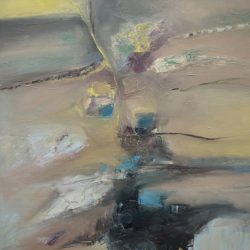
CASTELUL DE APA / THE WATER CASTLEUn război de o sută de ani
la întretăierea drumurilor comerciale,
– știam ce m-așteaptă!
Iată-mă deci
rotind ușor mașinăria privirii bolnave
spre întortocheatele sunete
care îmi desăvârșesc graiul celest.
Să povestesc oare despre inutilitatea rememorării
în cumplita tinerețe de mijloc a faptelor?
Sau (mai bine) despre drumul meu însingurat
prin pâcla elementelor dintr-o dimineață de iarnă?
Să opresc ficțiunea pe treptele castelului de apă
de la sfârșitul a două războaie,
crenelat ca o memorie previzibilă
și duios, aidoma ei?
Sau (mai bine) să pornesc mașinăria privirii
în catacombele contemporane
spre spaima și freamătul celor care mă citesc?Dar vine ochiul glumeț și mă bate pe umăr:
„Dulceață, aidoma ție s-au mai văzut!”Mai bine așa,
îngrijindu-te de însămânțările celeste
din preajma castelului de apă,
crenelat și duios
cu toate crimele de pe steaguri…Mariana MARIN
………………..A Hundred Years War
at the crossroads of trade routes,
– I knew what awaited me!
So here I am
gently turning the machinery of the sick gaze
towards the twisted sounds
that perfect my heavenly speech.
Shall I tell about the futility of reminiscing
in the terrible middle youth of facts?
Or (better yet) about my lonely way
through the fog of the elements on a winter morning?
Shall I stop the fiction on the steps of the water castle
at the end of two wars,
crenelated as a predictable memory
and tender, like her?
Or (better yet) turn on the gaze machine
in contemporary catacombs
to the fright and thrill of those who read me?But the funny eye comes and taps me on the shoulder:
“Sweetness, I’ve seen your kind before!”Better that way,
tending to the celestial seeds
around the water castle,
crenelated and tender
with all the crimes on the flags…
Under water castle, painting by Giedre ZUKAUSKAITE, UK
trad. M. M. Biela

Copyright © 2024 by Magdalena Biela. All rights reserved.